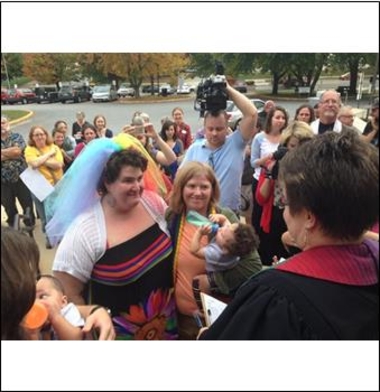Lawsuit challenges religious objection law in North Carolina

Charlotte, N.C. (AP) — A federal lawsuit filed Wednesday challenges North Carolina's law allowing magistrates to refuse to perform gay marriages based on their religious beliefs, arguing that it violates equality and church-state provisions in the U.S. Constitution.
The lawsuit, filed by three couples, seeks to overturn the law, which was pushed by Republicans in the state legislature and passed in June over the veto of GOP Gov. Pat McCrory. Under the law, local magistrates, who can preside over marriages, and some register of deeds officials, who issue licenses, can opt out of performing marriages if they have a "sincerely held religious objection."
Only North Carolina and Utah provide religious-objection options for court officials.
In North Carolina, any official's decision to opt out applies to all marriages — same-sex and heterosexual — for at least six months. About 5 percent of the state's roughly 670 magistrates had filed recusal paperwork as of September, according to the state court system.
The lawsuit focuses primarily on the magistrate exception, arguing that it treats gay and lesbian couples differently, in violation of the equal-protection provision in the Constitution. The lawsuit also puts religious belief above the obligations of magistrates to carry out laws they swore to uphold, critics say.
The law "does not represent the values of inclusion on which North Carolina was built," Chris Sgro, executive director of gay-rights group Equality North Carolina, said in a news release. "It targets same-sex couples directly for discrimination and in the process also restricts access to taxpayer-funded government services for all North Carolinians."
Backers of the law say that it protects religious freedom and that government employees should be allowed religious accommodation if marrying same-sex couples runs counter to their beliefs.
The law, pushed by Senate leader Phil Berger, R-Rockingham, was filed when several magistrates resigned shortly after federal judges in October 2014 struck down North Carolina's 2012 constitutional amendment prohibiting gay marriage. The state's top court administrator said at the time that magistrates who declined to officiate for same-sex couples could be fired or face criminal charges.
The plaintiffs include two same-sex couples. One of them, Kay Ansley and Cathy McGaughey, helped overturn in court North Carolina's 2012 constitutional ban. The third couple, a white woman and black man, successfully sued in the mid-1970s when Forsyth County magistrates refused to marry them on religious grounds, according to the lawsuit.
The religious objection law has required officials in McDowell County, about 75 miles northwest of Charlotte, to bring in magistrates from adjoining Rutherford County because several McDowell magistrates have opted out of marriages under the law.
Copyright 2015 The Associated Press. All rights reserved. This material may not be published, broadcast, rewritten or redistributed.
The Gayly – December 9, 2015 @ 10:40 a.m.





